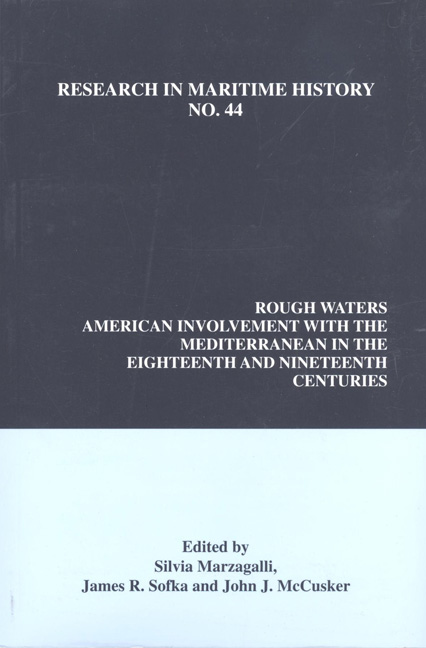Book contents
- Frontmatter
- Contents
- About the Editors
- Contributors' Notes
- “Rough Waters: American Involvement in the Mediterranean in the Eighteenth and Nineteenth Centuries: An Introduction”
- “Worth a War? The Importance of the Trade between British America and the Mediterranean”
- “Relations between North America and the Italian Peninsula, 1763-1799: Tuscany, Genoa and Naples”
- “American Shipping into the Mediterranean during the French Wars: A First Approach”
- “Notes toward a Franco-American Mediterranean 'From Below'”
- “Consuls and Consiglieri: United States Relations with the Italian States, 1790-1815”
- “Old and New Republics: Diplomatic Relations between the Republic of Genoa and the United States of America”
- ‘“From the Halls of Montesuma, to the Shores of Tripoli:’ Antoine Zuchet and the First Barbary War, 1801-1805”
- “Minorca: The First United States Naval Base in the Mediterranean and the American Consulate at Port Mahon”
- “‘The Jeffersonian Idea of National Security’ Revisited”
- “The Reluctant Warrior: Thomas Jefferson and the Tripolitan War, 1801-1805”
- “Slavery as Social Mobility? Western Slaves in Late Eighteenth Century Algiers”
- “Americans in the Mediterranean in the Late Eighteenth and Early Nineteenth Centuries: Concluding Remarks”
“Old and New Republics: Diplomatic Relations between the Republic of Genoa and the United States of America”
- Frontmatter
- Contents
- About the Editors
- Contributors' Notes
- “Rough Waters: American Involvement in the Mediterranean in the Eighteenth and Nineteenth Centuries: An Introduction”
- “Worth a War? The Importance of the Trade between British America and the Mediterranean”
- “Relations between North America and the Italian Peninsula, 1763-1799: Tuscany, Genoa and Naples”
- “American Shipping into the Mediterranean during the French Wars: A First Approach”
- “Notes toward a Franco-American Mediterranean 'From Below'”
- “Consuls and Consiglieri: United States Relations with the Italian States, 1790-1815”
- “Old and New Republics: Diplomatic Relations between the Republic of Genoa and the United States of America”
- ‘“From the Halls of Montesuma, to the Shores of Tripoli:’ Antoine Zuchet and the First Barbary War, 1801-1805”
- “Minorca: The First United States Naval Base in the Mediterranean and the American Consulate at Port Mahon”
- “‘The Jeffersonian Idea of National Security’ Revisited”
- “The Reluctant Warrior: Thomas Jefferson and the Tripolitan War, 1801-1805”
- “Slavery as Social Mobility? Western Slaves in Late Eighteenth Century Algiers”
- “Americans in the Mediterranean in the Late Eighteenth and Early Nineteenth Centuries: Concluding Remarks”
Summary
After the signing in 1783 of the Treaty of Paris, the Continental Congress intensified its efforts to negotiate treaties of amity and commerce with the major European states. In May 1784 a special commission comprised of Benjamin Franklin, Thomas Jefferson and John Adams was appointed to carry out this mission. The Ministers Plenipotentiary met in Paris and began to contact the diplomatic representatives of various European countries, submitting to each the general form of a proposed treaty.
None of the Italian states they consulted – the Reign of the two Sicilies, the Reign of Sardinia, the Papal States, the Grand Duchy of Tuscany and the Republic of Venice – responded positively to the American offer. Although the Republic of Genoa, like the other Italian states, did not reach an agreement, it moved on its own initiative. In fact, just before the three American ministers had officially submitted their proposal, the Serenissimi entrusted Cristoforo Vincenzo Spinola, the Genoese Minister in Paris, with the task of sounding out Franklin on the possibility of dispatching “a consul or an agent to Boston who would assist as far as possible in all circumstances the ships arriving and trading to the [United] States of America.” On 13 September 1784 Franklin replied to Spinola, informing him that
previous to the appointment of a Consul, some convention will be necessary, that may ascertain his powers, privileges, and that such a convention will most naturally follow a Treaty of Amity and Commerce; we take this occasion to inform you of our having full powers for making such Treaties; and that we are willing and ready to enter into a negotiation for that purpose with the Most Serene Government of Genoa, whenever it shall be to them agreeable.
Based on Franklin's favourable response, and on the grounds of the treaties previously signed by the United States with France (1778), Holland (1782) Sweden (1783), as well as that signed between the Republic of Genoa and Denmark (1756), in the spring of 1785 he drafted a Progetto di Trattato d'Amicizia, Commercio, e di Navigazione fra la Serenissima Repubblica di Genova e i Stati Uniti dell'America Settentrionale [Project of a Treaty of Amity, Trade and Navigation between the Most Serene Republic of Genoa and the United States of North America].
- Type
- Chapter
- Information
- Rough WatersAmerican Involvement with the Mediterranean in the Eighteenth and Nineteenth Centuries, pp. 101 - 116Publisher: Liverpool University PressPrint publication year: 2010



